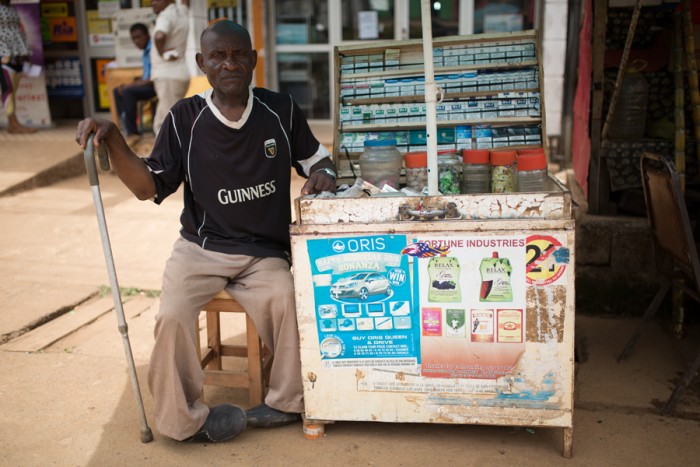April 4th, 2016 by Rachel | Tags: Disability, Peace Corps, Persons with Disabilities of Cameroon, Photography | No Comments »
During the last seven months of my Peace Corps service, I will be featuring photographs and stories of several persons with disabilities living in Cameroon. All the photos will be part of a series called “Persons with Disabilities of Cameroon.” The goal of presenting photographs and their stories is to create better awareness about the plights that persons with disabilities face in a developing country. When I return to the US, I hope to exhibit this series in a gallery and publish a book to educate others about persons with disabilities living in developing countries as this topic is so rarely discussed in the media.

From looking at Richard, it may appear that he was born with club feet, but his feet were normally structured when he was born. When he was three years old, he had high fever and was taken to Bamenda Regional Hospital by his parents. The hospital gave him a Quinimax injection which was administered on one side of his buttocks. Before he was sick, he was able to walk normally and very well. The injection, which is known to cause paralysis, weakened both of his legs. He then was no longer able to walk. Both legs became very weak. His parents took him to a traditional healer. The traditional healer cut both of his legs and put traditional medicines into his legs. He said, “That is why I am able to walk.” He can walk slowly with a walking stick but his feet are turned inwards. He says his feet became deformed when he became sick. He also uses a tricycle to move around. He says, “When I was given a national disability card, the medical report said I have 90% deformity.”
While only 2% of all Cameroonians with disabilities receive formal education, Richard defied against the deplorable statistic. Thanks to his parents who believed in him, he completed primary and secondary school. His parents sent him to a Christian school, and they paid the fees. If he had gone to a government school, it would have been cheaper because of disability ID card. Children with disabilities in Cameroon can go to a government school at a reduced fee if they have a disability ID card. There were missionary workers, and Richard said they were very accommodating. He had little barriers in going to school because he had a tricycle growing up and used it to commute to school.
He is a businessman now and sells basic needs on a street including cigarettes, lighters and tissues. He is married. His wife helps with household work. He has three children, ages ranging from 3 years old to 11 years old.
His biggest challenge today as a persons with disability is gaining access to healthcare because the cost is too high. He said that there are treatments that he would like to get but he can’t due to lack of financial means. He also said that he believes that his disability impacts his ability to earn money. He also said that he wishes to work with computers as an occupation and hopes to go to a computer school so that he can get a job working with computers.
His mother passed away in 2006 due to stress at the age of about 70 years old. Like most elderly Cameroonians, no one knows her birth date as there were no birth certificates. Richard and his family owned a bookstore selling religion books. There was a fire disaster in the same year, and the whole bookstore was destroyed. The fire was caused by an electric heater that was left on in the building next door. As a result, his mother became stressed because they no longer could make money for the family. He still has the building but he has not had the money to rebuild it. That is why he has been working on the street as a businessman. His father also passed away at the age of about 70 years old, in 2011, due to kidney problems.
